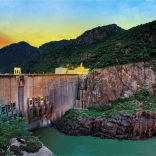Indian steel tycoon's pathway to Mozambique coal deal reopens
Opinion: A just energy transition for Mozambique – and Mozambicans | By Lothar Freischlader

Photo courtesy: Embassy of the Federal Republic of Germany to Mozambique
Like most countries suffering from climate change and yet least responsible for it, Mozambique seeks a just transition of its energy sector.
The Mozambican Government has been clear: a just energy transition should combine investments in fossil fuels with increased energy use from renewable sources. The goal is to provide access to clean power for all Mozambicans by 2030. But Mozambique also wants to become a leading energy exporter in the region.
These ambitious plans would require a massive investment in power generation, transmission, and distribution in the years to come. At the same time, Mozambique’s ambitions offer an opportunity: to shape its energy transition to benefit all Mozambicans in the long term.
Universal access to power by 2030
Only about 38% of Mozambicans have access to the electricity grid. The Government is working to ensure that by 2030, all Mozambicans will do. The challenge for the country is to use its abundant renewable energy sources and finance the necessary infrastructure to ensure that the entire population connects to the grid.
Germany has been supporting the Government of Mozambique in these efforts. A good example is the recent rehabilitation of the Mavuzi and Chicamba hydropower plants, financed with its EU partners France and Sweden. Cyclone Idai partly destroyed this infrastructure – revealing the devastating impact of climate change. Another example is the support of private sector companies in distributing solar home systems throughout the country. Decentralised technologies, in particular, contribute to more resilient energy infrastructure.
Looking to the future, the approval of the new Electricity Law is essential to pave the way for universal access to power. Private companies can contribute substantially to this objective by providing technology and capital.
A clean energy transition in Southern Africa
Mozambique is well-positioned to become a clean energy hub in Southern Africa. The country has the potential to produce sufficient power to meet its domestic needs and those of the region. Mozambique is rich in fossil and renewable energy sources. Its coal, gas, hydropower, wind, and solar resources offer the most significant power generation potential in Southern Africa.
The region, including South Africa, has a huge energy demand and relies mainly on climate-damaging coal. Mozambique’s hydropower projects offer excellent opportunities to contribute to a clean transition of the entire region. They allow for a gradual replacement of fossil fuels by climate-friendly power generation solutions in the Southern African Power Pool.
To this end, the Mozambican Government has invested in a high-voltage transmission line between Mozambique and Malawi that will boost clean energy trading in the region. We are happy to have contributed to this critical project. However, further investments in infrastructure are needed to ensure that Mozambique can continue exporting energy from carbon-neutral sources.
Balancing green and fossil energy sources
We are all aware of Mozambique’s vast gas reserves and the Government’s desire to leverage them to deliver socio-economic benefits for its people.
Germany shares the view that Mozambique should define its just energy transition. Undoubtedly, diversifying energy sources and increasing renewable energy use are fundamental worldwide. But this is vital in a country that is already painfully feeling the effects of climate change. According to the 2021 Global Climate Index, Mozambique was the most affected country by extreme weather events in 2019, with climate-induced natural disasters recurring with increased intensity and frequency.
Therefore, we encourage the Government of Mozambique to avoid new investments in coal-fired power plants and fossil fuel infrastructure in general.
Climate financing
At COP 27, we recognise Mozambique’s vision of support for adaptation and climate-induced ‘loss and damage’. This critical topic is high on the COP agenda for the first time. It matters a lot to countries like Mozambique, which need massive financial investments to adapt to climate change’s impact and better access to international financing. We are open to exploring a ‘mosaic’ of suitable solutions to address this issue more prominently. One example of German-Mozambican cooperation in this realm is the Green Infrastructure Park in Beira, a world-class project on climate-resilient infrastructure.
In this regard, it is worth mentioning that Germany will increase public climate finance from over 5.3 billion Euros at present to 6 billion Euros by 2025. It is also in Mozambique’s interest to focus on increasing ambition for mitigation at COP27 to keep the 1.5-degree limit of the Paris Agreement within reach. This limit is critical for a vulnerable country like Mozambique.
To this end, Germany stands ready to deepen our bilateral cooperation further. We remain committed to supporting Mozambique’s energy sector, to which we currently contribute over 240 million Euros.
During the next Mozambican-German intergovernmental negotiations in Maputo on 8 and 9 November, we will have the opportunity to exchange initial thoughts with our Mozambican partners on the potential for a broader climate and energy partnership, ideally in the framework of an international partner group.
After all, we share a common vision: a just energy transition that can protect the climate, boost Mozambique’s sustainable economic development, and deliver socio-economic benefits to all women, men, and children in Mozambique for decades to come.
By Lothar Freischlader
- Ambassador of the Federal Republic of Germany to Mozambique













Leave a Reply
Be the First to Comment!
You must be logged in to post a comment.
You must be logged in to post a comment.